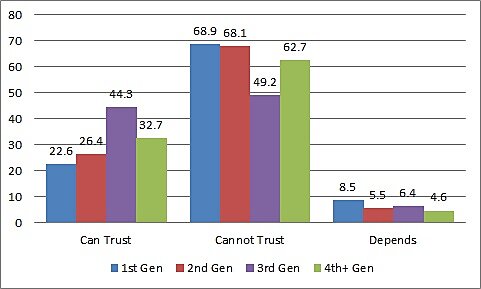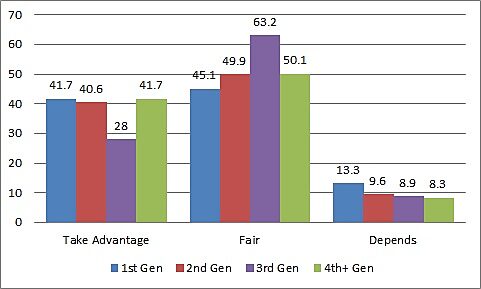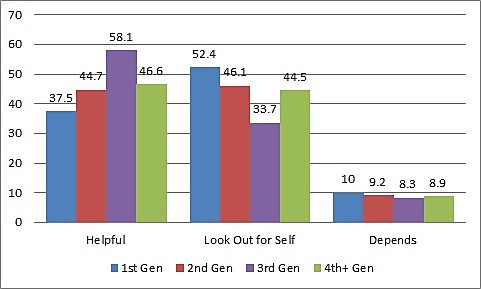One common criticism of immigrants is that they could undermine American institutions, weakening them so much that future economic growth will decrease so that the long run costs of liberalization are greater than the benefits. As I’ve written before this criticism doesn’t hold up to empirical scrutiny but a new line of attack is that immigrant trust levels could weaken productivity. I decided to look at trust variables in the General Social Survey (GSS), a huge biennial survey of households in the United States, to see if immigrants and their children are less trusting than other Americans. The results were unexpected.
The first variable examined was “trust.” The question asked was: “Generally speaking, would you say that most people can be trusted or that you can’t be too careful in life?” I confined the results to the years 2004–2014 to measure more recent immigrants. The first generation is the immigrant generation, the second generation are children of immigrants, the third generation are the grandchildren of immigrants, and the fourth+ generation includes their great grandchildren and every older generation.
The first and second generations are less trusting than the third generation, confirming the findings of the literature. However, the fourth-plus generation is about as distrustful as the first and second generations. The immigrants and their children are not the trust anomaly, the third generation is. They are more trusting than every other generation of Americans (Figure 1).
Figure 1
Trust
Source: General Social Survey
Related to “trust,” the “fair” variable asks: “Do you think most people would try to take advantage of you if they got a chance, or would they try to be fair?” It reveals the same pattern as “trust” –first and second generations are much more likely to say people try to take advantage than the third generation (Figure 2). However, the fourth+ generations are nearly indistinguishable from the immigrant generation and their children. Only the third generation sees other people as particularly fair.
Figure 2
Fair
Source: General Social Survey
The third variable examined was “helpful,” which asks: “Would you say that most of the time people try to be helpful, or that they are mostly just looking out for themselves?” The same pattern emerged – the first and second generations were more similar to the fourth-plus generation. The second generation is nearly identical to the fourth-plus generation. The third generation was most likely to say that most people were helpful and least likely to say that people look out for themselves. Again, the third generation is the trust anomaly, not the immigrants.
Figure 3
Helpful
Source: General Social Survey
The differences between immigrants, their children, and fourth-plus generation Americans are small when it comes to levels of trust, opinions of fairness, and whether people are helpful. It’s hard to see how these small differences could comprise the micro foundations of an institution-based argument against liberalized immigration. The question is not why native-born Americans trust and immigrants don’t, it’s why do third generation Americans trust so much while all other Americans and immigrants do not?
Notes:
For “trust,” there were 1039 first generation respondents, 364 from the second generation, 327 for the third generation, and 4988 for the fourth-plus generation. For “fair,” there were 972 first generation respondents, 345 from the second generation, 304 for the third generation, and 4699 for the fourth-plus generation. For “helpful,” there were 986 first generation respondents, 347 from the second generation, 303 from the third generation, and 4700 from the fourth-plus generation.



